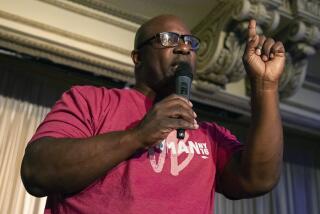Lazio’s a ‘Real New Yorker,’ but Can That Win Senate Race?
- Share via
YONKERS, N.Y. — When Rick Lazio toured a Yonkers seniors center recently, the boyish-looking Long Island congressman got enthusiastic support for his Senate race against Hillary Rodham Clinton. Yet few in the room knew anything about his record in Congress or the positions he’s running on.
“All I know is, he’s a real New Yorker,” said Josephine Santucci, her voice trailing off. “And he’s not her,” added Clara Maffucci. “That’s really all you need to know.”
But it’s become increasingly clear that that’s not all Lazio needs to win. While he has raised a staggering $30 million, much of it from Hillary-haters across the nation, the GOP candidate has yet to define himself to voters, and it’s hurting him in the polls. The most recent survey showed Clinton beating him, 50% to 43%.
When Lazio became the nominee in June, his staff outlined a blueprint for victory: He would stress his Long Island roots, attack Clinton as a carpetbagger who had no business running in New York and make the election a referendum about her. But this cautious strategy has gotten him only so far.
“At this point in the race, Rick still has to fill in the blanks about himself,” longtime GOP media consultant Nelson Warfield said. And it’s crucial, he added, because Clinton “has become a formidable candidate. More formidable than many in New York would have originally predicted.”
Lazio faces a daunting challenge under any circumstances in this heavily Democratic state, especially in a presidential election year. Most polls give Democrat Al Gore a 20-percentage-point lead in New York over Republican presidential candidate George W. Bush, and strategists in both parties believe a heavy turnout Nov. 7 might be enough to push Clinton over the top, no matter what Lazio does.
Still, he has yet to maximize his advantages. A telling example can be found in his poll numbers in traditionally Republican upstate New York. The farms, small towns and suburbs north of Manhattan typically generate 40% of the statewide vote. Most Republicans win handily here if they expect to capture statewide office, yet the most recent poll showed Lazio clinging to only a 7-point lead.
To be sure, Lazio has a healthy edge over Clinton in the suburbs near Manhattan, according to several polls. Yet she has built a similarly huge lead in New York City. All the more reason for GOP officials to worry that the race has remained so close upstate, where many communities have been scarred by unemployment and a declining industrial base.
The region’s voters “still don’t know who Lazio is, and it’s clearly not been enough for him to paint [Clinton] as an outsider,” said Gerald Goldhaber, an upstate political analyst. “Meanwhile, Mrs. Clinton has basically moved into the area for the last year. She spends a great deal of time upstate, and the joke in some towns is, ‘You mean you’ve only had a cup of coffee with her once?’ ”
Debate Tactic Cast Lazio in Bullying Light
Equally surprising, Lazio has become a controversial figure in the campaign, taking flak for several gaffes. A key example was a recent comment downplaying the economic woes of upstate New York. Lazio quickly corrected himself, but it prompted an ironic retort from Clinton that he was badly out of touch with New York.
Lazio also is plagued by the lingering images of his first debate with Clinton, when he strode over to her podium and thrust in her face an agreement to ban soft money--the unlimited contributions to political parties that are used to indirectly help various candidates.
The act seemed bullying and condescending to many. Other critics, including Republican strategists, said Lazio’s heavy focus on banning soft money has puzzled voters who don’t understand what it means.
“It’s funny, he won the battle over campaign money [when Clinton agreed to the ban] but may have lost the war,” GOP pollster Frank Luntz said. “He went too far. Raising the issue was a stroke of sheer genius, but waving it in her face the way he did was a mistake.”
On the stump, Lazio can be gracious and thoughtful. In Yonkers, he spoke movingly about the devastation his family experienced when his now-deceased father suffered a stroke. “I will always be there for you on issues like Social Security, prescription drugs and Medicare,” he told the crowd at the Coyne Park Seniors Center.
The 42-year-old congressman has a moderate record that should strike a chord with many voters, and he excels at one-on-one encounters on the stump. But despite his growing fund-raising edge over Clinton--he has $10.2 million in cash on hand; she has $7.1 million--many New Yorkers have yet to see the warm, positive side of him, in person or in television spots.
Campaign officials say Lazio will change this in coming weeks with a flurry of appearances upstate and a TV ad blitzkrieg. During his second debate with Clinton last weekend, Lazio was more upbeat, stressing his positions. And he increasingly has featured glowing images of his family--his wife, Patricia, and their two young daughters--on the campaign trail. Yet some wonder if Lazio has simply blown too many political opportunities to overcome Clinton.
“He’s not running a great campaign,” said Jeffrey Stonecash, professor of political science at Syracuse University. “He doesn’t have a clear idea how to work the state and hasn’t given voters a reason to vote for him.”
In his defense, Lazio had scant time to assemble a campaign operation that could compete with Clinton. He entered the race 24 hours after New York Mayor Rudolph W. Giuliani bowed out on May 19 amid disclosures that he had prostate cancer and a marriage that was publicly unraveling.
Giuliani was expected to be a strong candidate. Yet the maverick mayor was not the favorite of party leaders such as Gov. George Pataki, who prefers Lazio.
Raised in West Islip, Lazio grew up in a blue-collar Republican household and seemed destined for politics at an early age. He graduated from Vassar College in upstate New York, got a law degree from American University in Washington and became an assistant district attorney for Suffolk County, N.Y.
After holding local office in Suffolk County, he won a House seat in 1992 by knocking off a longtime Democratic incumbent. His moderate views reflected his district, but he showed survival skills when Republicans claimed the House majority in the 1994 election. Lazio served as a deputy whip to new Speaker Newt Gingrich (R-Ga.), mainly as a bridge to other moderates.
Strength May Lie in Unity Message
Hillary Clinton has tried to attack him as a Gingrich clone, but the charge does not seem to be sticking. Lazio essentially supports abortion rights--although he opposes so-called partial-birth abortions--and he has a strong record on environmental issues. He led fights to provide better housing for seniors, and his ability to work with Democrats underscores his claim that he would be a unifying rather than a divisive force in the Senate.
Yet questions linger about whether he and his campaign aides have the experience and discipline to mount a successful statewide race. Last week, Lazio visited grade-school classrooms near Manhattan two days in a row, discussing civics. They were his only public appearances those days, and reporters asked why he had done this, when there were voters elsewhere to be won over.
Lazio said he enjoyed visiting schools, then got combative about his dip in the polls. “The race is far from over. And I feel in my bones we’re going to win.”
More to Read
Get the L.A. Times Politics newsletter
Deeply reported insights into legislation, politics and policy from Sacramento, Washington and beyond. In your inbox twice per week.
You may occasionally receive promotional content from the Los Angeles Times.










